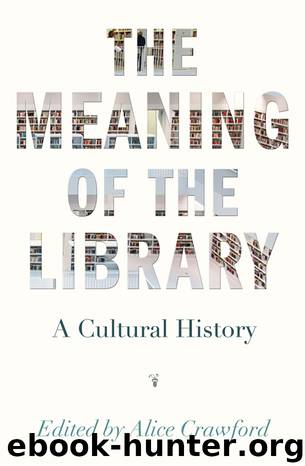The Meaning of the Library by unknow

Author:unknow
Language: eng
Format: epub
Publisher: Princeton University Press
Published: 2015-09-25T16:00:00+00:00
PART 2
THE LIBRARY IN IMAGINATION
CHAPTER 7
The Library in Fiction
Marina Warner
THE STORY IN THE STONE
The opening paragraph of the earliest work of literature yet known to us evokes the act of its own making: how “the whole story” it tells was engraved on a stone.1 The narrator declares:
I will proclaim to the world the deeds of Gilgamesh. This was the man to whom all things were known; this was the king who knew the countries of the world. He was wise; he saw mysteries and knew secret things, he brought us a tale of the days before the flood. He went on a long journey, was weary, worn-out with labour, returning he rested, he engraved on a stone the whole story.2
This is from the translation of N. K. Sandars, published by Penguin in 1960, which I read when an undergraduate at Oxford and which became a cult book of my student days. The poem that follows has since been reedited for rendering in English and many other languages, and Sandars’s work has been superseded as more fragments have been found and reinterpreted. The epic that is still emerging from these accretions tells the story of the semidivine Gilgamesh, King of Uruk, through his heroic and hubristic adventures until his tragic initiation into the knowledge of mortality. Engraving the story on a stone, this earliest of heroes attempts to stay the moment when he will be forgotten; the stone will become part of the fabric of the city he is building as part of his claim on eternity, a stone that is a book, for his great city will include a library.
The tablets on which the Epic of Gilgamesh is written lay in the Assyrian library of Ashurbanipal for millennia. They were unearthed, millions of scattered, battered, and chipped clay pages, between 1850 and 1853, during the excavations of Nineveh (today, near Mosul). Austen Henry Layard was the remarkable archaeologist who supervised the revelations; over subsequent decades, thousands more tablets were found in the ruins of Babylon and Uruk and other lost cities of Anatolia, Armenia, and Khuzestan, formerly Elam. The majority of these findings were deposited in tray loads in the British Museum as part of its collections of objects; the tablets have remained there, after the numerous scholarly works they gave birth to, including the many translations and versions of the poem, were placed in the British Library, which was only formally divided from the museum in 1973, thus instituting a new distinction between stones and books. Pieces of Babylonian, Sumerian, and Akkadian poetry, alongside hoards of legal documents, accountants’ audits, tallies of sheep and goats, and other databases of antiquity, continued to be dug up from the desert cities of the ancient civilizations in the region of present day Iraq. Over the last two decades and the two Gulf wars, tons of bombs have fallen on the region. It is one of the several irreversible and melancholy consequences of the conflicts there and the air power brought to bear, that what might have remained buried under the sand will now have been smashed to smithereens.
Download
This site does not store any files on its server. We only index and link to content provided by other sites. Please contact the content providers to delete copyright contents if any and email us, we'll remove relevant links or contents immediately.
The Goal (Off-Campus #4) by Elle Kennedy(12424)
Kathy Andrews Collection by Kathy Andrews(10510)
Diary of a Player by Brad Paisley(6865)
What Does This Button Do? by Bruce Dickinson(5522)
Assassin’s Fate by Robin Hobb(5231)
Big Little Lies by Liane Moriarty(4877)
Pale Blue Dot by Carl Sagan(3997)
Sticky Fingers by Joe Hagan(3451)
The Heroin Diaries by Nikki Sixx(2928)
The Death of the Heart by Elizabeth Bowen(2897)
Beneath These Shadows by Meghan March(2714)
The Help by Kathryn Stockett(2700)
Confessions of a Video Vixen by Karrine Steffans(2669)
How Music Works by David Byrne(2522)
Jam by Jam (epub)(2482)
Harry Potter 4 - Harry Potter and The Goblet of Fire by J.K.Rowling(2414)
Strange Fascination: David Bowie: The Definitive Story by David Buckley(2364)
Petty: The Biography by Warren Zanes(2234)
Darker Than the Deepest Sea by Trevor Dann(2205)
